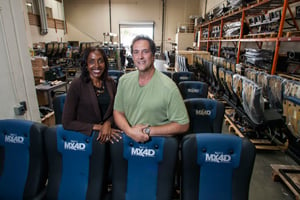
MediaMation Inc., a Torrance company that makes movable seats for movie theaters which sway along with the action, is now looking to shake up the video-game business.
The firm is diversifying to embrace a surging entertainment craze – video-game tournaments attended by fans in movie theaters.
The new line of gyrating seats are custom designed to help fans get into the action by feeling every explosion, earthquake, and laser blast rather than just passively watching the action on the big screen.
“Millennials who grew up on video games don’t just want to watch games, they want to experience them,” said Dan Jamele, 55, president of MediaMation.
The new line of seats is made with the company’s trademarked MX4D technology, which enhances the viewing experience with synchronized effects such as mist, spray, wind, fog, smoke, and even odors. They were unveiled earlier this month at the annual Electronic Entertainment Expo video-game conference downtown.
“Motion seats is a way to bring gamers, who used to have the experience at home, to a theater,” said Paul Dergarabedian, senior media analyst in the Van Nuys office of global media measurement company comScore. “It is a fun technology which turns a movie or game into a live show.”
Surging numbers
Nearly 50 percent of adults in the United States play video games every day, according to the Pew Research Center, an all-time high. That, in turn, has led to a new entertainment phenomenon: video-game battles attended by fans in thousands of movie theaters not just here but around the world.
Most such competitions, known as e-sports, take place in Europe, Asia, and North America, with a global audience of about 226 million in 2015, according to various studies.
The global e-sports market generated $325 million in revenue last year, a number that is expected to rise to $463 million this year and hit more than $1 billion by 2019, according to Newzoo, a San Francisco research firm that specializes in the gaming industry.
MediaMation’s co-founders are confident that applying their technology to video games will increase revenue opportunities.
As movie theaters continue to compete for business with online entertainment services such as Netflix, the motion seats help reel in consumers – and at premium prices. Supplemental charges for motion seats add between $5 and $8 to the price of a ticket.
For its movie seat technology, the company collects an upfront charge for its installations, and generates revenue through maintenance fees and fees from studios for programming movies to trigger the seat movement and other effects. It hopes to collect similar fees from video-game companies and additional theaters installing its seats. The private company would not disclose financials.
Entertainment background
Before co-founding MediaMation in 1992 with her husband, Alison Jamele, 53, worked in TV production as a writers’ assistant for sitcoms; Dan was an audio engineer for theme parks, where he was first inspired to work with sound and create interactive attractions.
The company started out selling its technology to theme parks and other tourist attractions – customers include Legoland California Resort and the San Diego Air and Space Museum – before expanding to movie theaters in 2009.
Since then, MediaMation has grown to employ 55 people at its Torrance facility and an additional 68 at factory in China.
The company claims its sales last year were up 30 percent from 2014. An average theater requires from 100 to 200 seats at a cost of from $500,000 to $700,000 for the installation.
While MediaMation has installed its seats in theaters in Japan, South Korea, China, and Mexico, finding domestic customers has been difficult. It has installed its seats in just three theaters – one in Oxnard and two in Boston.
“The U.S. market is so saturated, so it is difficult to have this type of business in the U.S.,” Alison Jamele said. “Americans have so much.”
Thus the pivot to the video-game tournament market, where overseas business is expected to drive more sales and, it is planned, eventually boost domestic revenue.
“This industry is growing and becoming increasingly popular. That’s a great opportunity for us,” said Dan Jamele.
